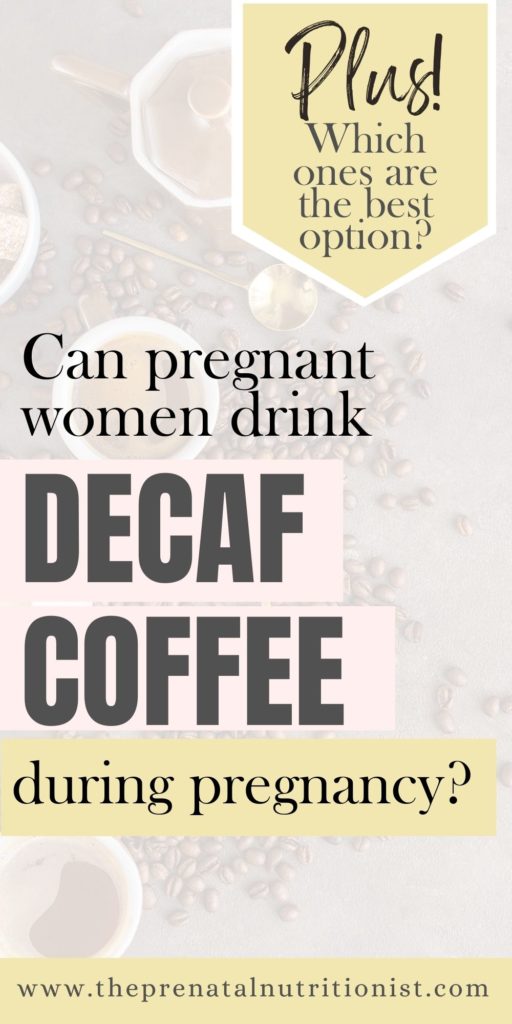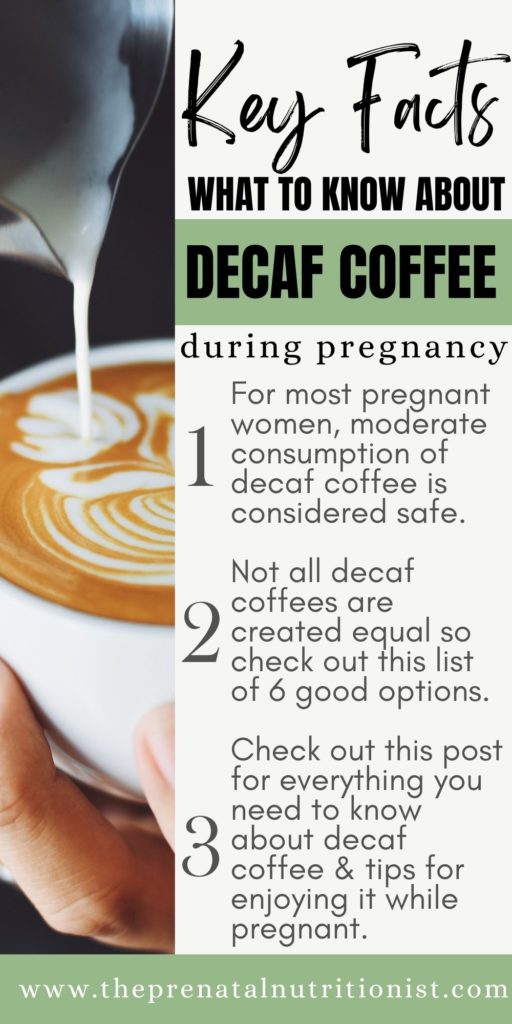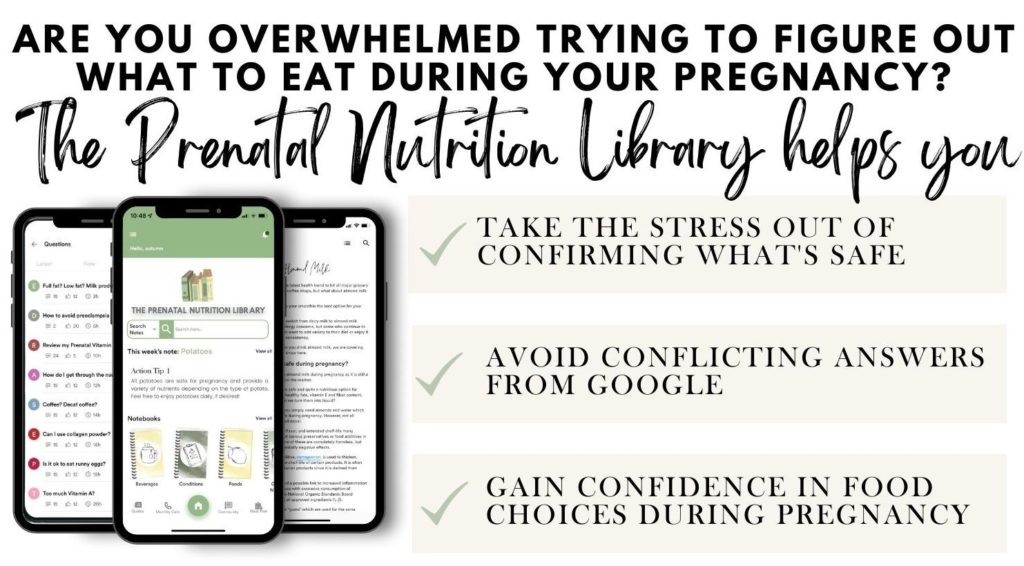
Coffee is beloved worldwide for the energy boost and warmth it provides. For many expecting mothers, the rich flavor and aroma of coffee are deeply comforting; others might have an aversion to it altogether. However, high amounts of caffeine can be harmful to a baby’s development during pregnancy. It’s understandable for pregnant women to wonder, “Is it ever okay to drink coffee while pregnant?”.
(You can also dive deep into the research on caffeine during pregnancy inside The Prenatal Nutrition Library.)
Regarding caffeine while pregnant, current guidelines from organizations like the American College of Obstetricians and Gynecologists recommend limiting caffeine intake to under 200 mg per day. If you want to lower your caffeine intake, you may wonder about decaffeinated coffee. This coffee variant boasts much lower caffeine than regular brews, typically under 10mg per 6 fluid oz serving.
Caffeine aside, there are other considerations and precautions to take when drinking decaf coffee during pregnancy. This post explores whether drinking decaffeinated coffee is a suitable option for pregnant women who are craving their coffee fixes.
I will discuss decaf coffee’s caffeine content compared to regular brews, provide tips for the safe consumption of decaf coffee during pregnancy, and recommend some higher-quality decaf brands. I aim to empower expectant mothers with evidence-based information regarding their daily beverage choices!

Can You Drink Decaf Coffee While Pregnant?
For most pregnant women, moderate consumption of decaf coffee is considered a safe option. Despite popular belief, decaf does not mean it’s 100% caffeine-free. It’s very low in caffeine, especially compared to a regular cup of coffee, but does contain a few milligrams. The USDA requires coffee classified as decaf to contain a maximum of 0.1% of caffeine, with 97% of the caffeine removed!
This equates to decaffeinated coffee containing less than 10 mg of caffeine per 8 fluid oz serving. In comparison, regular brewed coffee has about 100 mg of caffeine (or more) per 8 fluid oz serving. In contrast, the very low caffeine content of decaffeinated coffee makes it possible to enjoy it in moderation without worrying about exceeding guidelines!
Coffee is decaffeinated through three main methods. These include the solvent process, water process, and CO2 process. The method used to create decaf coffee makes a difference in the safety and quality of the coffee product. We’ll discuss this more below.
Drinking small to moderate amounts of decaffeinated coffee, such as 1-2 eight fluid-ounce cups daily, will not likely harm you or your baby. Decaf coffee provides minimal nutrient benefits but can be an enjoyable beverage to complement your meals without adding caffeine.
Swapping for quality decaf is a suitable, low-risk alternative for pregnant women simply craving the rich flavors and comforting warmth of their morning coffee ritual. Of course, for those very sensitive to caffeine, it’s important to remember that decaf still contains small amounts of caffeine. For most, decaf coffee provides satisfaction without undue cause for concern!

Tips for Drinking Decaf Coffee While Pregnant
Drink In Moderation
There’s no “set limit” on decaffeinated coffee during pregnancy. However, it’s still important to make room for plenty of other hydrating fluids, keep overall caffeine intake in mind, and not exceed the 200mg limit when combined with caffeine from other sources. Some individuals considered “high risk” during pregnancy may need to limit caffeine further.
Consume Away From Meal and Snack Time
Even though decaf coffee contains minimal caffeine, both regular and decaf coffee contains polyphenols, specifically tannins, which can also inhibit folate and iron absorption. For this reason, it’s best to consume your decaf coffee separately from meals and snacks (or prenatal vitamins) rich in iron or folate. This is most important if you have low iron or anemia.
Add a Splash of Milk
Adding a splash of full-fat cow’s milk increases protein, fat, and micronutrients. If your appetite is low, a small pat of grass-fed butter or unsweetened heavy cream can also be good options for extra calories and beneficial fats.
Choose High-Quality Decaf Brands
When possible, buy decaf coffee labeled as “Swiss water processed” or CO2 processed, as these do not include chemicals. Decaf coffee labeled as only organic may still be processed with solvents.
Order a Smaller Size
Order a smaller size if you are someone who is especially sensitive to the effects of caffeine because, remember, decaf can still contain a small amount of caffeine.

Best Decaf Coffee To Drink While Pregnant
Equal Exchange Decaf
Equal Exchange Decaf is decaffeinated using the CO2 process. This organic and fair trade decaffeinated coffee has only 3 mg of caffeine in a standard cup. It has a very smooth taste that is loved by many.
Swiss Water Process Decaf
A collection of Swiss water process coffee brands. There are options of varying roast levels, origins, and certifications to find your best option.
Mount Hagen Organic Instant Coffee
Made using a CO2 process method, they remove 99.99% of the caffeine. It has a robust flavor and adheres to many quality standards and certifications. This option has a bold taste like a traditional brewed coffee.
Cafe Don Pablo Subtle Earth Decaf
Crafted using the Swiss water method, this brand tastes like the real thing without the caffeine. Notes of cocoa and toasted nuts create a smooth, full-bodied experience reminiscent of top-shelf beans. It has a rich body and complex flavor.
Savorista Caffeine Conscious Coffee
Savorista uses decaffeination methods without chemicals like Swiss Water and Sugarcane EA (done in Colombia). They offer both decaf and half-caf options from all over the world, including single-origin. Use code RYANN at checkout to get 25% off your entire order today!
Peet’s Decaf House Blend
This crowd-pleasing mix uses the Swiss water process and has many 5-star reviews. Toasty flavors shine through for an option satisfyingly close to regular brews. It brews up bold notes of toast with a very low amount of caffeine.

In moderation, decaf coffee is a safe beverage to enjoy during pregnancy.
In conclusion, the occasional cup of low-caffeine decaf coffee is generally considered safe for pregnant women. However, quality can make a big difference, and it’s still important to monitor total daily caffeine intake from all sources. Consult your healthcare provider for individualized guidance tailored to your pregnancy needs and health history. Overall, a moderate intake of high-quality decaf coffees provides enjoyment without increased risk!
Focusing on a well-balanced diet, incorporating plenty of fluids, and being mindful of overall added sugar and caffeine intake are just a few aspects of a healthy pregnancy. Make my blog your go-to guide for all things food and nutrition for pregnancy. I answer common prenatal nutrition questions weekly on the blog, including “Does Chai Tea Have Caffeine?” and “Are Energy Drinks Safe While Pregnant?”.
For more in-depth information on nutrition during preconception and pregnancy, plus expert-crafted trimester-specific meal plans, check out The Prenatal Nutrition Library (TPNL). The Prenatal Nutrition Library App is your one-stop shop for evidence-based answers to all your pregnancy nutrition questions so you know what you eat is safe and provides optimal nutrients for pregnancy.
Want to try a sample meal plan first??? Download my FREE 1-week meal plan for pregnancy!












